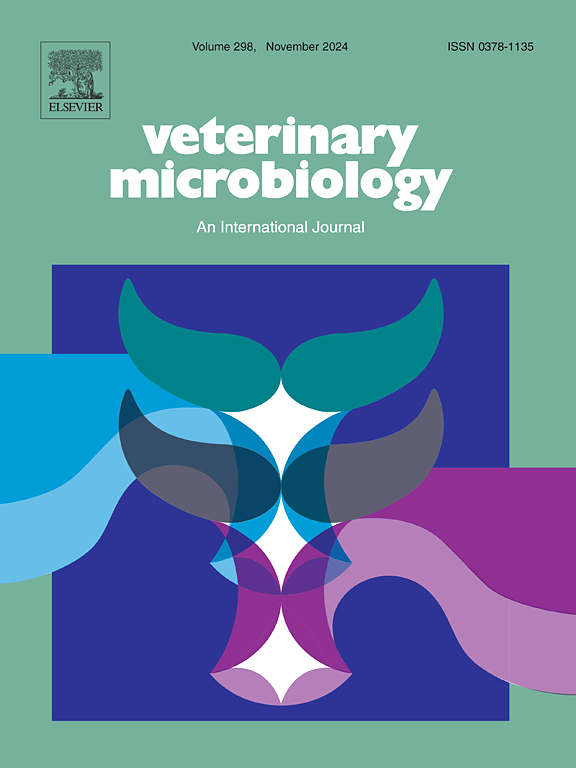SSBP1 promotes bovine ephemeral fever virus replication by antagonizing antiviral immune responses via degrading MAVS
IF 2.7
2区 农林科学
Q3 MICROBIOLOGY
引用次数: 0
Abstract
Mitochondrial single-stranded DNA-binding protein 1 (SSBP1), a component of the mitochondrial DNA replisome, is involved in DNA replication, repair and maintenance of mitochondrial DNA. However, its function in the bovine ephemeral fever virus (BEFV) infection has not been described. Herein, we found that SSBP1 acted as an essential negative regulator of mitochondrial antiviral signaling protein (MAVS) to maintain immune homeostasis. Under BEFV infection, SSBP1 was upregulated in host cells, which boosted the susceptibility to virus. SSBP1 dramatically impaired BEFV-triggered antiviral immune response by degrading MAVS. Mechanistically, SSBP1 induced K48-linked ubiquitination of MAVS catalyzed by Smad ubiquitin regulatory factor 1 (Smurf1), thereby promoting ubiquitinated-MAVS for proteasomal degradation. Most importantly, we identified A01, a Smurf1-specific inhibitor that blocked degradation of MAVS induced by SSBP1 and enhanced MAVS-mediated antiviral signaling, consequently suppressing BEFV replication. Taken together, our findings reveal that SSBP1 restricts BEFV-induced innate immune activation through SSBP1-Smurf1-MAVS signaling axis, indicating its potential role as a therapeutic target for viral infections.
SSBP1通过降解MAVS拮抗抗病毒免疫反应,促进牛短暂热病毒复制
线粒体单链DNA结合蛋白1 (SSBP1)是线粒体DNA复制体的组成部分,参与线粒体DNA的复制、修复和维持。然而,它在牛短暂热病毒(BEFV)感染中的作用尚未被描述。在此,我们发现SSBP1作为线粒体抗病毒信号蛋白(MAVS)的重要负调节因子来维持免疫稳态。在BEFV感染下,宿主细胞中SSBP1表达上调,增强了对病毒的易感性。SSBP1通过降解MAVS显著削弱befv触发的抗病毒免疫反应。机制上,SSBP1诱导由Smad泛素调节因子1 (Smurf1)催化的k48连接的MAVS泛素化,从而促进泛素化的MAVS蛋白酶体降解。最重要的是,我们发现了一种smurf1特异性抑制剂A01,它可以阻断SSBP1诱导的MAVS降解,增强MAVS介导的抗病毒信号,从而抑制BEFV复制。综上所述,我们的研究结果表明,SSBP1通过SSBP1- smurf1 - mavs信号轴限制befv诱导的先天免疫激活,表明其作为病毒感染治疗靶点的潜在作用。
本文章由计算机程序翻译,如有差异,请以英文原文为准。
求助全文
约1分钟内获得全文
求助全文
来源期刊

Veterinary microbiology
农林科学-兽医学
CiteScore
5.90
自引率
6.10%
发文量
221
审稿时长
52 days
期刊介绍:
Veterinary Microbiology is concerned with microbial (bacterial, fungal, viral) diseases of domesticated vertebrate animals (livestock, companion animals, fur-bearing animals, game, poultry, fish) that supply food, other useful products or companionship. In addition, Microbial diseases of wild animals living in captivity, or as members of the feral fauna will also be considered if the infections are of interest because of their interrelation with humans (zoonoses) and/or domestic animals. Studies of antimicrobial resistance are also included, provided that the results represent a substantial advance in knowledge. Authors are strongly encouraged to read - prior to submission - the Editorials (''Scope or cope'' and ''Scope or cope II'') published previously in the journal. The Editors reserve the right to suggest submission to another journal for those papers which they feel would be more appropriate for consideration by that journal.
Original research papers of high quality and novelty on aspects of control, host response, molecular biology, pathogenesis, prevention, and treatment of microbial diseases of animals are published. Papers dealing primarily with immunology, epidemiology, molecular biology and antiviral or microbial agents will only be considered if they demonstrate a clear impact on a disease. Papers focusing solely on diagnostic techniques (such as another PCR protocol or ELISA) will not be published - focus should be on a microorganism and not on a particular technique. Papers only reporting microbial sequences, transcriptomics data, or proteomics data will not be considered unless the results represent a substantial advance in knowledge.
Drug trial papers will be considered if they have general application or significance. Papers on the identification of microorganisms will also be considered, but detailed taxonomic studies do not fall within the scope of the journal. Case reports will not be published, unless they have general application or contain novel aspects. Papers of geographically limited interest, which repeat what had been established elsewhere will not be considered. The readership of the journal is global.
 求助内容:
求助内容: 应助结果提醒方式:
应助结果提醒方式:


